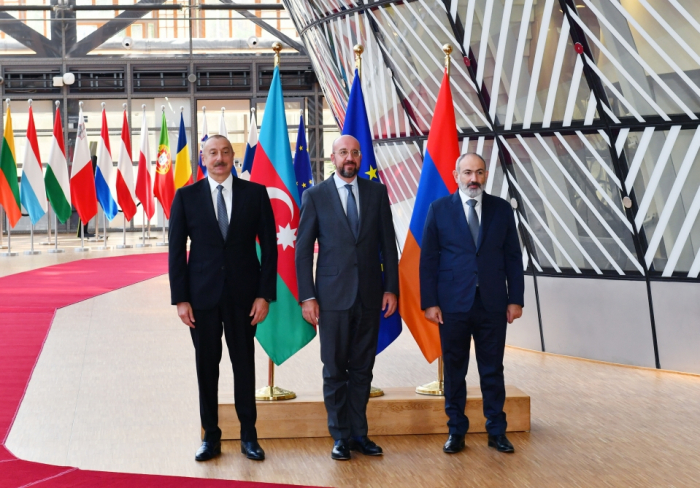On August 31, President Ilham Aliyev of Azerbaijan and Prime Minister Nikol Pashinyan of Armenia met for the sixth time since the end of the Second Karabakh War. As opposed to the first two meetings (January 11 and November 26 in 2021) which were mediated by Russia, the last four meetings, including the August 31 summit, have been mediated by the European Union (EU) and held in Brussels. The latest summit built upon the achievements of the previous two EU-mediated summits (April 6 and May 22) which called for starting the preparations for a peace treaty, set up an international commission on delimitation and demarcation of the Armenia-Azerbaijan state border, and settling outstanding issues on transport and communication links . Most importantly, on August 31, the sides agreed to step up work on the peace treaty, and tasked the Foreign Ministers to meet within one month to work on draft texts.
The growing role of the EU as a mediator in this process annoys the Russian side that insists on reading it through the lens of geopolitical rivalry in the region. Hence, following the April 6 and May 22 summits and prior to the August 31 summit, Russia’s Ministry of Foreign Affairs criticized the EU, and accused it of trying to hijack the Armenia-Azerbaijan peace process. This, once again, demonstrated that the Russia-West confrontation can threaten the peace negotiations between the two South Caucasian republics. The latest report of the International Crisis Group, warned that “Western capitals and Moscow should try to ensure that their standoff over Ukraine does not bleed into mediation efforts” between Baku and Yerevan.
However, to the benefit of regional peace and security in South Caucasus, so far, the peace negotiations between Armenia and Azerbaijan have not been negatively affected by current tensions between Russia and the west. Although Moscow criticized the EU’s mediation initiatives, it has not challenged the implementation of the agreements between the sides, including those reached in the EU-mediated platform.
On the contrary, a long list of major developments took place between the May 22 and the August 31 summits – through the mediation of both Russia and the European Union. The border commission, which Baku and Yerevan agreed in Brussels to establish, met twice – first at the Armenia-Azerbaijan border on May 24 and then in Moscow on August 30 – and agreed to meet again in November – this time in Brussels.
The working group on the re-opening of regional transportation channels which was established in January 2021 and headed by the deputy prime ministers of Armenia, Azerbaijan and Russia, met in Moscow on June 4. This was followed by the first bilateral meeting of the Armenian and Azerbaijani foreign ministers in July which preceded the announcement of the Armenian government about the withdrawal of Armenian armed forces from the Karabakh region in line with the fourth article of the trilateral statement of November 10, 2020. The armed escalation in early August between the Armenian and Azerbaijani troops accelerated the withdrawal of the Armenian forces from the region as declared by President Aliyev in his interview with local television channels on August 12.
This process marked another milestone in late August when the Lachin town and two Azerbaijani villages returned to the control of Azerbaijan as the new highway connecting Armenia and the Karabakh region replaced the previous one. The peaceful transition was of remarkable significance, as it demonstrated the potential of the sides to implement the agreements that they have reached including the remaining provisions of the 2020 trilateral statement.
Thus, the Russia-West standoff over the past six months since the beginning of the Russia-Ukraine war has so far not undermined the peace talks between Armenia and Azerbaijan. Quite the opposite, we have seen both Washington and Paris declaring their readiness to cooperate with Russia in this process – which puzzled many observers given the tense situation over Ukraine. It is true that the motivation of the Western actors in cooperation with Russia in this issue might be linked with their desire to preserve a role in the settlement of the Armenia-Azerbaijan disputes over the Karabakh region – which is reflected in their controversial calls to revitalize the defunct Minsk Group against the will of the Azerbaijani side. Azerbaijani officials have recently stated that such attempts of Washington and Paris would turn out to be counterproductive and exclude them from the Armenia-Azerbaijan peace process.
The western role in the process was reaffirmed by the August 31 summit, where the sides, according to the statement of President Michel, focused on the normalization of the Armenia-Azerbaijan relations and did not touch upon the future of the Karabakh region where Russia’s peacekeepers have been deployed. This assuages Russia’s concerns since Moscow still maintains a certain role in talks about the problems between Baku and Yerevan related to the Karabakh region of Azerbaijan, and also in the negotiations about the regional transportation corridors.
Against this backdrop, the two tracks of peace talks (i.e., the EU-mediated and the Russia-mediated) find a favourable environment to run without contradicting each other. This raises hope that the recent positive developments between Baku and Yerevan will advance in the upcoming months and the sides can make progress on the peace treaty negotiations, recognizing each other’s territorial integrity and internationally-recognized borders.
Vasif Huseynov is Head of Department at the Baku-based Centre of Analysis of International Relations (AIR Centre).
More about: Azerbaijan EU Armenia
















































